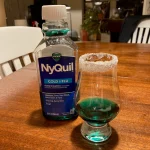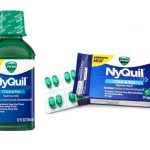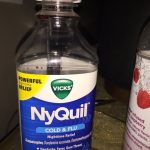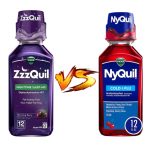Does NyQuil Make You Sleepy?
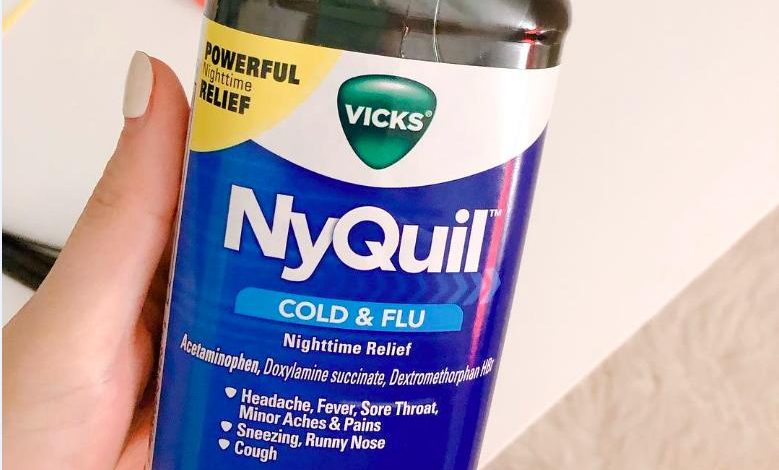
What Is NyQuil?
NyQuil is a popular over-the-counter medication that is used for the treatment of symptoms of flu, common cold, and other similar illnesses and allergies. It is manufactured and sold by Vicks, a U.S. medicine company. NyQuil provides temporary relief for coughing, headaches, stuffy and runny nose, sore throat, fever, and sneezing. It also helps people with cold symptoms sleep through the night. While it provides relief for cold symptoms, it is not a cure for the common cold or the flu. NyQuil is generally safe and effective for adults and children over the age of 6.
What are the ingredients in NyQuil?
There are three active ingredients in NyQuil namely:
- Acetaminophen: is an analgesic that relieves pain and lowers fever by stopping the production of certain chemicals in the brain that causes both pain and fever.
- Dextromethorphan: is a cough suppressant that works in the part of your brain that makes you cough, calming it down and telling your body to cough less.
- Doxylamine: is an antihistamine that works by blocking histamine, a natural chemical in your body that causes congestion, sneezing, and wakefulness.
How should I take NyQuil Cold & Flu?
Use exactly as directed on the label, or as prescribed by your doctor. Do not use it for longer than recommended. Cough and cold medicines are usually taken only for a short time until your symptoms clear up. Typical dosing for Nyquil Cold and Flu are as follows:
Oral liquid: Each 30 mL dose cup contains 650 mg of acetaminophen, 30 mg of dextromethorphan, and 12.5 mg of doxylamine.
• Adults and children 12 years and older: The typical dose is 30 mL (2 tablespoons) by mouth every 6 hours. Don’t take more than 120 mL (8 tablespoons) in a 24-hour period unless your provider specifically told you to do so.
• Children 4-11 years old: Ask your child’s provider.
• Children 3 years and younger: Don’t use.
Oral capsules: Each capsule contains 325 mg of acetaminophen, 15 mg of dextromethorphan, and 6.25 mg of doxylamine.
• Adults and children 12 years and older: The typical dose is 2 capsules by mouth with water every 6 hours. Don’t take more than 8 capsules in a 24-hour period unless your provider specifically told you to do so.
• Children 4-11 years old: Ask your child’s provider.
• Children 3 years and younger: Don’t use.
Do not take more of this medication than is recommended. An overdose of acetaminophen can damage your liver or cause death. Measure liquid medicine with a special dose-measuring spoon or medicine cup. If you do not have a dose-measuring device, ask your pharmacist for one.
Stop taking the medicine and call your doctor if you still have a sore throat after 2 days, or if you have a fever, headache, rash, nausea, or vomiting.
If you need surgery or medical tests, tell the surgeon or doctor ahead of time if you have taken Nyquil Cold & Flu within the past few days.
Store at room temperature away from moisture and heat. Do not allow the liquid medicine to freeze.

What In Nyquil Makes You Sleepy?
The 3 ingredients in NyQuil all perform different functions, acetaminophen reduces fever and alleviates minor pain, dextromethorphan suppresses coughing, and doxylamine is an antihistamine (anti-allergy medication) that relieves congestion, sneezing, and sore throat. Doxylamine also helps people sleep, but it sometimes causes drowsiness during the day. Some forms of NyQuil also contain alcohol as an inactive ingredient which can make you extremely tired, especially if you take a large dosage at once.
Vicks the manufacturer of this drug also manufactures and sells DayQuil, a similar medication for users who want to relieve cold symptoms without feeling drowsy during the workday. DayQuil alleviates the same symptoms as NyQuil. DayQuil contains acetaminophen and dextromethorphan, but it does not contain doxylamine. Instead, DayQuil contains phenylephrine, a non-drowsy nasal decongestant.
What are the side effects of taking NyQuil?
Side effects that you should report to your doctor or health care professional as soon as possible:
• allergic reactions like skin rash, itching or hives, swelling of the face, lips, or tongue
• breathing problems
• changes in vision
• confusion
• over excited, nervous, or restless
• problems with balance, talking, walking
• trouble passing urine or change in the amount of urine
• unusual bleeding or bruising
• unusually weak or tired
• yellowing of the eyes or skin
Side effects that usually do not require medical attention (report to your doctor or health care professional if they continue or are bothersome):
• drowsy, tired
• headache
• nausea, stomach upset
This list may not describe all possible side effects. Call your doctor for medical advice about side effects. You may report side effects to FDA at 1-800-FDA-1088.

